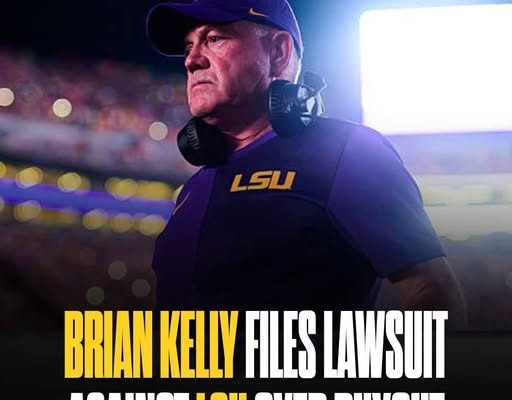LSU finds itself mired in a heated legal and financial impasse with Brian Kelly, the coach it fired earlier this season, and the disagreement over his buyout terms has escalated into a full-blown lawsuit. At the heart of the matter is the roughly $54 million Kelly claims he is owed, based on his multi-year contract — a number that LSU now apparently contests, or at least seeks to negotiate down.
Kelly signed a 10-year, $95 million deal with LSU in 2021. (SI) Under the terms of that deal, if he were dismissed “without cause,” he would be paid 90 percent of the remaining value of his contract in monthly installments that stretch through 2031. For Kelly, being fired without cause means full entitlement to that $54 million‑plus payout. LSU, however, has shifted its legal posture. In a surprise move, representatives for the university told Kelly’s team that, contrary to prior messages, he was never formally terminated on October 26 Not only that, but LSU now says it might try to fire him for cause, which would significantly reduce—or possibly eliminate—its payout obligation
In response, Kelly has filed a lawsuit in East Baton Rouge Parish, seeking a declaratory judgment that he was indeed terminated without cause, and demanding formal recognition from LSU that it must honor the full contractual buyout. His legal team argues that LSU has no basis for a “for-cause” termination, because they never gave him written notice of such grounds within the seven-day window stipulated in his contract According to the suit, that window was missed, and LSU didn’t make any formal claim of misconduct at that time
The history behind this confrontation is messy. Kelly was dismissed after a 5–3 start in his fourth season, following a lopsided loss to Texas A&M. At first, LSU framed his exit as a matter of performance — pointing to unmet expectations and referring to his inability to reach the level of success LSU demands. (SI) But now, according to Kelly’s lawsuit, LSU is shifting its rationale, suggesting more serious issues beyond losing games. Importantly, Kelly’s side contends that LSU has not publicly articulated what “for cause” grounds it believes exist; the lawsuit says no such explanation has been provided.
Part of the dispute also centers on who had the authority to terminate Kelly and negotiate a separation in the first place. When he was dismissed, the athletic director was Scott Woodward, who also made the prior settlement offers to Kelly.But in the lawsuit, Kelly’s side claims that LSU is now arguing Woodward didn’t actually have the authority to fire him or to make binding settlement proposalsThat’s a major pivot — because if Woodward lacked that authority, it potentially undermines the legitimacy of any prior settlement negotiations and could strengthen Kelly’s case that his termination was valid and without cause.
The two sides attempted to reach an agreement before the lawsuit. According to reports, LSU floated a lump-sum payment of $25 million, then later raised the offer to $30 million, split into two installments. (SI) Kelly rejected both of those offers. From his standpoint, those settlement proposals did not reflect the full value he believes he is contractually owed. In his communications with the university, Kelly explicitly demanded that LSU fulfill its full “liquidated damages” obligations. He even set a deadline — 5 p.m. on November 10 — for LSU to commit in writing to paying the full amount. (SI) When that deadline passed without satisfactory confirmation, he filed suit
In public remarks, Kelly has signaled he remains open to a settlement, if the numbers “make sense financially.”He acknowledged his time at LSU didn’t turn out as ideally as he’d hoped, but insisted that the contract he signed must be honored.For his part, LSU has not publicly disclosed what, if any, specific contract violations it believes justify termination for cause. According to the lawsuit, the university has not indicated any particular behavior or infraction that would warrant such a claim, and in any case, it failed to deliver formal notice in writing in accordance with the terms of the contract. Until now, the public justification for the decision has largely remained centered on performance, as suggested by internal LSU documents, public statements, and commentary at the time of Kelly’s firing.
Another complicating factor is the role of LSU’s leadership. Within days of Kelly’s departure, Scott Woodward was himself removed from the athletic director role. The timing raised questions about how much of the standoff is tied to internal power struggles within LSU. Kelly’s lawsuit implies that some of LSU’s new leadership is disavowing Woodward’s prior authority to negotiate. That assertion, if substantiated, could be central to Kelly’s argument: if Woodward did not have proper authority, then offers made under his tenure may not be enforceable by LSU.
The political context also looms large. Louisiana Governor Jeff Landry has been openly critical of LSU’s handling of Kelly’s contract, calling the buyout “financially burdensome” for the school and questioning how much the university’s leadership is accountable. Landry has publicly weighed in on the situation, arguing for more oversight, and signaling that he is deeply concerned about how much LSU is paying out relative to its on-field performance. Some observers believe that this tension between Kelly and LSU is not just legal or financial, but institutional — an episode that reflects broader questions about governance, accountability, and financial responsibility at major college athletic programs.
Why is this such a high‑stakes deal? First, $54 million is not a trivial sum by any measure. The scale of the payout would make it one of the largest buyouts in college football history, and the structure — monthly payments through 2031 — underscores how long-term the obligation would be for LSU. (CBS Sports) Second, the legal precedent matters: if Kelly wins a declaratory judgment that he was terminated without cause, LSU may have little choice but to honor the full contract. Otherwise, if LSU successfully argues cause, that could dramatically reduce its financial liability.
The buyout dispute also raises questions about the deal-making process. Some of Kelly’s side argues that LSU negotiated aggressively when building the contract, offering very favorable terms — and now, having decided to move on from Kelly, may be attempting to back out of the full burden of what it promised. Kelly’s attorneys frame their legal action not just as a fight for money, but also as a defense of a contract’s sanctity: they argue that LSU signed a handshake on a deal, then changed its mind when it became too expensive.
As for next steps, the lawsuit is not just symbolic — Kelly’s camp is pushing for legal clarity. The request for declaratory judgment means he wants a court to officially declare that he was fired without cause and that LSU must pay the full $54 million. That kind of ruling would set the terms for how much he is paid, how he is paid, and whether any offset or mitigation clauses might apply if he were to find another coaching job. Meanwhile, LSU would likely defend itself by arguing that there are legitimate grounds for cause, or that procedural missteps mean it does not owe the full sum under the contract as written.
Publicly, LSU has declined to comment in detail, citing legal considerations. Behind the scenes, the school may be weighing the reputational damage of a bitter court fight versus the financial and political implications of cutting deeper into its budget to resolve the dispute. For Kelly, litigation is a way to force accountability. For LSU, pushing back could be a gamble: if it wins, it limits its financial burden; if it loses, it pays a steep price.
Critics of LSU’s approach argue that the university is undermining its own contractual credibility by trying to recast Woodward’s authority retroactively, or by suggesting cause with no clear, publicly stated basis. Others, however, wonder if Kelly is simply standing on legal principle while looking for a big cash payout. But for Kelly, the fight may not be just about the money: it could be about preserving his legacy and ensuring that LSU lives up to the promises it made.
In the larger landscape of college sports, this standoff illustrates how the business of coaching has become deeply entangled with institutional power, donor money, and politics. High-dollar contracts are now normal; mega‑payouts are an accepted risk for universities, but when things go south, the fallout can be messy, public, and legally complex. LSU vs. Kelly could become a bellwether case — not just for how coaches are paid off, but how universities manage leadership transitions, contract enforcement, and accountability.
For now, both sides are entrenched. Kelly wants his full $54 million, and he’s not backing down. LSU appears willing to argue cause, or at least to challenge the structure of what it owes. The deadline Kelly set came and went without a written, full‑pay commitment. Thus, the lawsuit, filed in East Baton Rouge, moves forward. A court may soon have to decide: was Brian Kelly’s termination for performance, and thus without cause, or does LSU have a valid case to deny—or reduce—the payout it once promised?



